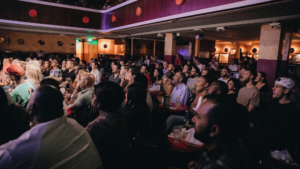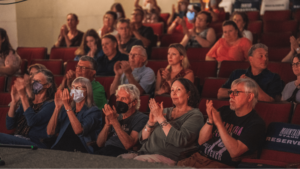We constantly consume music, whether we are aware of it or not, and we will end up in situations where we participate in subconscious listening every day.
This could be at the supermarket, with music playing over the loudspeakers, during TV ads or programmes, where music often sits in the background to augment a mood. It could also be at an event or conference, where there is either a live band or background music being played in the venue.
All of this subconscious or inactive listening has an impact on how we behave.
So, how does music at events affect people’s behaviour?
We mostly think of music as pure entertainment, but marketers have been using it to influence our behaviour for decades. It’s a particularly prolific strategy in consumer goods industries, but the principles can easily be applied to the event industry.
Using the right type of music can potentially be very profitable, and as such there’s been a lot of research into exactly how different types of music affects behaviour within a specific environment. Certain types of music can make us move through a space faster, linger longer, change our perception of queue times or makes us spend more.
Related: 10 Brilliant, unusual live music options for your next event
Unsurprisingly, fast paced music makes people move faster, and so does loud music. Slow music generally makes people slow down. It might be basic, but it’s an important factor in creating a specific mood for an event. Do you want people to be energised and buzzing, or relaxed and laid-back?
So if you’re putting on a race or sporting event, you’ll want to increase the volume and get some dance or rock music blasting out to energise your participants. However if you’re running an exhibition and want people to linger and chat at stalls, you’ll probably want to opt for slower, softer sounds to keep the pace steady and encourage more conversations.
If you like to listen to music, like most of us, you will have experienced how it can impact your mood. This is something the media and marketers know how to take full advantage of. In addition to our emotional reactions, they also play on the associations we attach to different types of music.
Classical music might be thought of as sophisticated and classy, while Jazz might be thought of as artistic and refined. When putting these general assumptions to the test, several experiments show that playing specific music can impact perceptions too. For example classical music can temporarily increase the perceived value of an item. In these situations people projected some of the associations they had with classical music, e.g. sophistication, onto the item itself.
So for your next conference, maybe you want to welcome attendees with a spot of classical music, or introduce your keynote speaker with it playing in the background, inferring sophistication and intelligence on everyone in the room as well as your speakers.
Related: Booking a band for events: the checklist
Whilst these are all very interesting ideas and findings, it’s difficult to say exactly how and how much of an impact a certain type or volume of music will have on your event attendees. However, it does highlight that it’s an area of your planning which you shouldn’t ignore. It’s potentially an under-utilised element in events, and if you analyse your audience and target market carefully you could reap some great awards.
Some research suggests that we are generally more susceptible to subtle cues, such as music, when we are mentally overloaded or tired. In a busy setting, such as a conference or networking event, this can be a real advantage. For example, if you wanted people to leave your event feeling energised and more confident – and associate that memory with event brand – then playing more upbeat songs and power ballads could really make a difference.
Similarly if you’re hosting a dating event, then love should be in the airwaves too – with classic ballads helping get people into the mood for meeting a partner.
The impact of background music, be it in a shop or at a conference, might be a small one if we just look at the behaviour of one individual. However, all of these small changes add up. Exhibitors might see an increase in sales or sales leads at your exhibition from having better conversations and less hurried traffic, delegates might listen to your speakers more attentively, and singles could rate the people they met at your event more highly. All of which should in turn boost your word of mouth. You see where I am going with this.
Related: Top 10 songs played at conferences and how to use them
Ultimately, regardless of what you do, you need to think about the demographic you are targeting. Make sure the music you choose is congruent with both your target group and your brand. Then the principles set out in this article should hopefully add an exciting new element into your planning process.
References:
- Judy I. Alpert and Mark I. Alpert (1989) ,”Background Music As an Influence in Consumer Mood and Advertising Responses”, in NA – Advances in Consumer Research Volume 16, eds. Thomas K. Srull, Provo, UT : Association for Consumer Research
- Using Background Music to Affect the Behavior of Supermarket Shoppers, Ronald E. Milliman, Journal of Marketing, Vol. 46, No. 3 (Summer, 1982)Charles S. Areni and David Kim (1993) ,
- “The Influence of Background Music on Shopping Behavior: Classical Versus Top-Forty Music in a Wine Store”, in NA – Advances in Consumer Research Volume 20, eds. Leigh McAlister and Michael L. Rothschild, Provo, UT : Association for Consumer Research
- Background Music Influences Buying Behaviour, September 10, 2015: http://www.psychologicalscience.org/index.php/news/minds-business/background-music-influences-buyer-behavior.html
- How Background Music Influences Shopping Behaviour, April 6, 2015: http://www.soundjack.com/blog/how-background-music-influences-shopping-behaviour/





